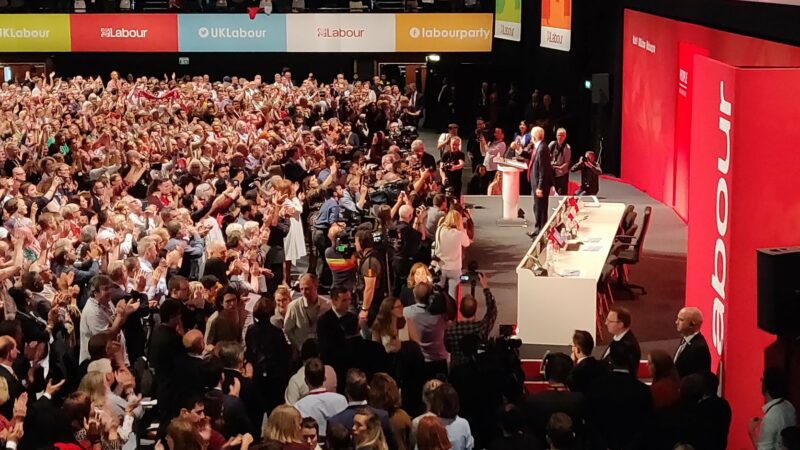
The story of the last decade has been one of crisis. It has been a crisis with many dimensions: from the financial crisis of 2008 to the social crisis of austerity, to the environmental crisis of climate change, to the crisis of the rise of the far right, xenophobia and racism.
We all know it is the most vulnerable who bear the brunt of these intersecting disasters. Increasingly, people also understand that finding a solution cannot just be a case of re-balancing impacts. Only a fundamental transformation of our systems and institutions can resolve these crises – and avert further ones. Following this week’s conference, the Labour Party is now more ready than ever to deliver this transformation.
A core part of Labour’s transformative programme will be our Green New Deal. The IPCC has warned that we have just ten years to limit average global warming to 1.5 degrees and stop runaway climate breakdown. With overwhelming support at conference, Labour now has an ambitious commitment to meet that demand and achieve a net zero emissions economy by 2030 – 20 years before current government targets.
The Green New Deal is not just a response to the developing climate crisis. It is also an integral part of Labour’s commitment to build an economy that values people and planet over profit. The worker-led just transition required to get there will be almost unprecedented in its size and scope. It will involve the massive expansion of public transport, the creation of energy-efficient housing stock through a huge building and retrofitting programme and a sweeping programme of advancements in the quality of everyday life based on the prioritisation of public need over private consumption.
But Labour’s plans don’t end at tackling climate change head on. Our commitment to ending the austerity-driven social crisis was reiterated by John McDonnell in his unapologetically socialist agenda: a 32-hour working week; compulsory purchase of empty housing and rent controls; an expansion of workers’ rights and workplace democracy; the abolition of private schools; a £10 an hour minimum wage; the building of a million homes; and a National Care Service offering free personal care for the elderly.
Jeremy Corbyn’s speech showed the extent of Labour’s ambition. Its centrepiece announcement – that Labour would create a national pharmaceutical manufacturer – is a perfect illustration of how Labour intends to re-right an economy turned upside down by neoliberalism. Through ensuring the cost of NHS drugs can be reduced, and more of the health budget put into patient care and not the pockets of big pharma, Labour really would be putting first the very many needy and not the avaricious few.
Whilst MPs returned to parliament to confront in the chamber Boris Johnson’s divisive hate-promoting politics, a still full conference hall passed a critical motion to begin the process of dismantling the Tories’ racist hostile environment. The Labour grassroots now unequivocally stands for the abolition of immigration detention centres, the enfranchisement and protection of the rights of all migrants and the defence and expansion of free movement.
This radical programme emerged not from closed-door meetings of party grandees but from campaign groups run by Labour members across the country. Groups like Labour for a Green New Deal, Abolish Eton and the Labour Campaign for Free Movement have sprung out of the rank-and-file of the party, encouraged by a leadership whose 2015 pitch was to make Labour a genuinely people-powered activist party.
The vitality of this movement was clear to see on the streets of Brighton. Beyond the secured fence of conference-proper and its official fringe, 5,000 people participated in The World Transformed – a festival of politics and culture that runs alongside Labour conference. Four years on from the exhilaration of Corbyn’s leadership win, people queued outside ten city-centre venues to claim their space in the transformational political project that has inspired people far beyond the UK.
They came to learn how to organise their workplaces, plan a general election campaign, unpick the knottiest political problems of today – and share their vision for a radically different future. Extinction Rebellion held a mass demonstration and a people’s assembly, ten set up a camp beside the main TWT event space. This movement, in all its diversity and complexity, connected to the trade unionists, campaigners and canvassers in conference hall, is also helping to decide democratically the path that the party will follow.
The Cummings-era Tories, with their shock and awe tactics, can posture about their anti-establishment credentials. When it comes down to it, they remain the party of the fossil fuel companies, the exploitative bosses, the landlords. Accountable to nobody and liked by nobody, their flailing Prime Minister can’t step out of the Westminster bubble without being booed and heckled.
In the coming election, Labour will win because it presents a real alternative to their crony capitalism, racism and the politics of permanent crisis. When offered the choice between autocratic disaster capitalism or democratic, environmental socialism, we know which way the British public will vote. We will launch the most ambitious election campaign in British political history, powered by a movement of ordinary people who have decided that enough is enough – and that when Labour wins, they win.




More from LabourList
Letters to the Editor – week ending 15th February 2026
‘Labour council candidates – it’s tough, but all is not lost’
‘Labour won’t stop the far right by changing leaders — only by proving what the left can deliver’